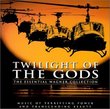| All Artists: Karl Ditters von Dittersdorf, Hanspeter Gmur, Failoni Orchestra Title: Dittersdorf: Sinfonias on Ovid's Metamorphoses Nos. 1-3 Members Wishing: 0 Total Copies: 0 Label: Naxos Original Release Date: 1/1/1995 Re-Release Date: 2/20/1996 Genre: Classical Styles: Historical Periods, Classical (c.1770-1830), Symphonies Number of Discs: 1 SwapaCD Credits: 1 UPC: 730099436823 |
Search - Karl Ditters von Dittersdorf, Hanspeter Gmur, Failoni Orchestra :: Dittersdorf: Sinfonias on Ovid's Metamorphoses Nos. 1-3
 | Karl Ditters von Dittersdorf, Hanspeter Gmur, Failoni Orchestra Dittersdorf: Sinfonias on Ovid's Metamorphoses Nos. 1-3 Genre: Classical
|
Larger Image |
CD DetailsSimilar CDs
Similarly Requested CDs
|
CD ReviewsCompetent performance of a very competent composer David Vidaurre | Miami, FL United States | 05/04/2001 (4 out of 5 stars) "Karl Ditters von Dittersdorf is certainly a second echelon composer but one of the best at that. His Sinfonias on Ovid's Metamorphoses are a good introduction to his music. The music lacks the genius of Mozart but it has flashes of inventiveness and inspiration. Some may think he overdoes the crecendos but I think they are well crafted and fun, in particular in the first Allegro of the Acteon Sinfonia which is my favorite in this recording. I was struck by the excellent performance of the Failoni Orchestra and the sound quality of the recording. Considering the price is an excellent value.This is music to relax and enjoy. It shouldn't be missing in any good all-around classical collection." Some Enjoyable Music and Music-Making M. C. Passarella | Lawrenceville, GA | 05/15/2006 (5 out of 5 stars) "Naxos has now recorded a number of the 120 some symphonies of Carl Ditters von Dittersdorf. If you'd like to hear what this composer is all about, the present CD is probably the best way to get to know his music. Capturing Ovid's retelling of ancient myth brought an imaginative response from Dittersdorf; to portray the more dramatic parts of the stories, the composer cuts loose with fiery allegros that remind us this music comes on the tail-end of the Sturm und Drang period. In fact, these allegros sound like the Haydn of the 1770s, just as the more contemplative slow movements, such as the lovely Larghetto of the Symphony "Four Ages of the World" and the Andante of the Symphony "Fall of Phaeton," remind one more of Mozart--not bad composers to be reminded of. On the other hand, there's no doubt that Dittersdorf's efforts lack the genius of either, and especially in the allegros there is some unneeded repetition and empty passage work. The minuets, also, represent maybe the weakest music here; both Mozart and Haydn could dance rings around Dittersdorf, so to speak. The pretty minuet from the "Actaeon" Symphony is an exception, but it has a dull trio as if to prove the rule.
On the other hand, there are those lovely slow movements, especially the Larghetto, which is nearly haunting in its beauty as the best Mozart slow music is. This Larghetto, by the way, is a portrayal of the world's Golden Age--golden music fully up to the task. The generally informative notes to the recording tell us there are no timpani in "The Fall of Phaeton." In that case, they must have been blasting outside the hall on the day of the recording; either that, or the note writer hadn't listened to the three fast movements, especially the last, where Zeus's thunderbolt is delivered by, what else? a thwack on these supposedly absent timpani. I find the performances spirited, the recordings fine--nicely detailed and yet not dry. So here is some enjoyable music; just don't expect anything groundbreaking or earthshaking." |

 Track Listings (12) - Disc #1
Track Listings (12) - Disc #1




![Franz Lehar: The Land of Smiles / Gustafson, Hadley, Itami, Atkinson; Bonynge [in English]](https://nationalbookswap.com/cd//m/22/6122/6006122.jpg)




